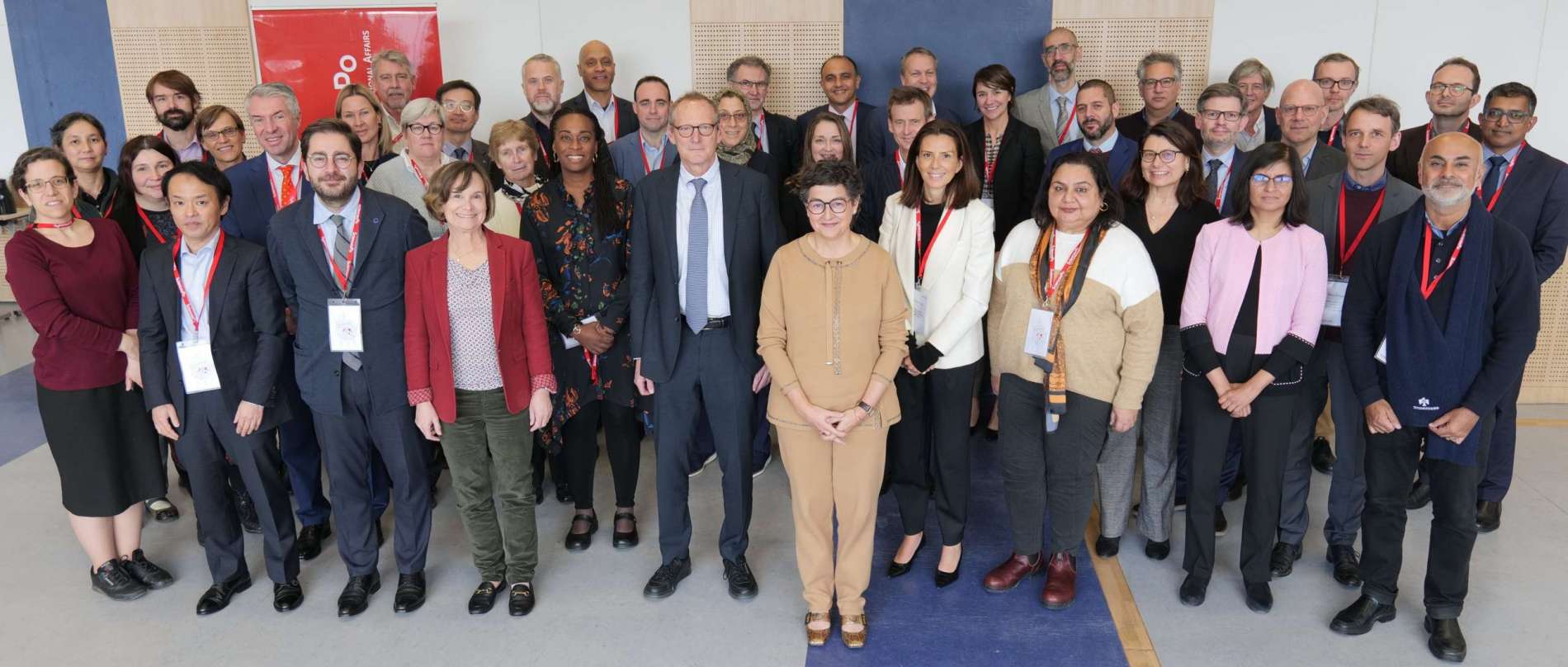APSIA Deans Convene in Paris for 2023 Meeting
On January 12-13, 2023, 42 leaders from 37 members and affiliates in 11 countries gathered for their annual in person meeting. Hosted by the Sciences Po Paris School of International Affairs, deans/directors discussed changing models of education delivery, trends in fundraising, ways to manage a growing faculty, and more.
On Thursday, January 12, the meeting kicked off with a series of small group chats.
Marie-Laure Salles, Director of the Geneva Graduate Institute, moderated a session on balancing academic freedom and risk. Participants considered how to bring thought-provoking issues and speakers into the classroom in a constructive way, as well as the need to set school policies before problems arise. They considered the importance of engaging others who hold different opinions, particularly as a skill for our students.
Rachel Kyte, Dean of the Tufts University Fletcher School, explored ways to break down the barriers to inclusivity at our schools. The group talked about the need to reexamine the assumptions that drive school policies, ways to build a pipeline for more diverse students, the need to diversify the faculty, and the importance of social capital - as well as financial capital - for students.
Judith Kelley, Dean of the Duke University Sanford School of Public Policy, encouraged attendees to share best practices in cross-school collaboration. Attendees discussed elements of student exchange, dual degree programs, and alternative models to collaboration, such as summer preparatory courses, BA-MA programs, and related types of exchanges.
Lars Strannegård, President of the Stockholm School of Economics, moderated an open conversation that covered everything from the role of AI (as both a tool for learning and for cheating) to ways to talk with faculty about different methods of evaluation and setting learning objectives.
Then, Manuel Muñiz, Provost of IE University and Dean of the, IE School of Global and Public Affairs, hosted a discussion about how schools of international affairs are navigating political influence and interference. The conversation considered the impact of geopolitics on the everyday work of (and the existential role of) our schools. Attendees compared strategies for understanding the impact of domestic and foreign political changes and explored how we can prepare for coming challenges.
On Friday, after a warm welcome from Sciences Po Director Mathias Vicherat, members and affiliates gathered for conversation and community.
Peter Loewen, Director of the University of Toronto Munk School of Global Affairs and Public Policy, moderated a look at trends in school fundraising. Participants talked through their experiences with campaigns, the critical need for strong, development and alumni relations staff, strategies to manage donor expectations, and the dynamics between school and university needs.
Carissa Schively Slotterback, Dean of the University of Pittsburgh Graduate School of Public and International Affairs, explored ways to manage a growing faculty. Participants considered the cultural changes that can happen when a school brings in more new / junior faculty, practices to facilitate hiring, and the distinct role of professors of practice.
Ann Fitz-Gerald, Director of the Balsillie School of International Affairs, helped attendees think through ways to evaluate the school’s climate. Participants explored a range of issues, including mental health, return to work, the impact of physical spaces on a school’s sense of community, and ways to solicit feedback in order to understand what is going on within your school.
Stefano Schiavo, Director of the University of Trento School of International Studies, led an open conversation. It touched on a range of subjects, including faculty hiring, managing student expectations, and changing student financial needs.
Next, Fritz Mayer, Dean of the University of Denver Josef Korbel School of International Studies, moderated a discussion of Building the Intellectual Perimeter of Your School on Campus. Participants said we should think of our community as “borderless,” even while recognizing that schools compete for attention and resources on their campuses. They considered ways of collaborating with other schools, as well as some of the messages and programs that help schools of international affairs stand out. Schools can become a ‘conductor’ on key issues with others ‘playing important roles in the orchestra.’
Finally, Arancha González, Dean of the Sciences Po Paris School of International Affairs, welcomed Jimena Pereyra, Pedagogical Lead, and alumna Beatriz Pont, Global Training Lead, at UNESCO’s International Institute of Educational Planning, to explore changing methods of content delivery in education.
Ms. Pereyra and Ms. Pont shared ways institutions can shift their thinking from content delivery to content design, including how students acquire knowledge, collaborate to expand knowledge, and produce knowledge. Small group chats among attendees considered how peer-to-peer mentoring (and pressure) can help faculty improve their teaching. They also discussed the opportunities and challenges of having technology in the classroom, whether PhD students should be taught how to teach, and various ways to connect the real world into the classroom.
Attendees also enjoyed time for fellowship and exploring the city, including a dinner at the Maison de l’Amérique Latine and cruise on the Seine.
During the meeting, members also affirmed a Strategic Plan to guide APSIA over the next five years.

